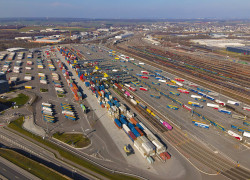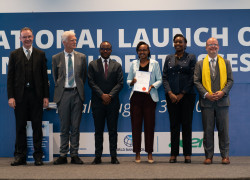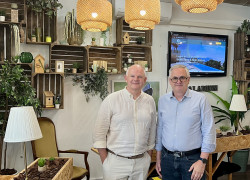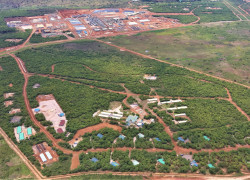Bloom or bust? Unlocking transition finance to reduce biodiversity loss
Biodiversity is important for the climate and the economy with c. 60% of global GDP moderately or highly dependent on nature.
Finance can help unlock the deployment of existing technologies at the speed and scale needed to reduce biodiversity loss by 2030, according to UBS. In its white paper ‘Bloom or bust’, produced with experts in the field and discussed at the World Economic Forum (WEF) Annual Meeting 2024, UBS takes stock of where the world stands on biodiversity loss, existing solutions, and the role that finance, government action, and collaboration can play.
Biodiversity is important for the climate and the economy
Biodiversity and climate are intrinsically linked; failing on one means failing on both. Around 37% of the costeffective emissions reduction required to be on track with the Paris Agreement by 2030 can be achieved with natural climate solutions[1]. Biodiversity is also economically important: UBS proprietary analysis shows c. 60% of global GDP is moderately or highly dependent on nature. As a result, there is growing investor, corporate and government interest in how to mobilize capital toward nature-focused solutions.
To tackle biodiversity loss, the global community agreed on the Global Biodiversity Framework (GBF) in 2022, aiming to reverse biodiversity loss by 2030 and to become nature-positive by 2050. It is a race against time to achieve these goals.
Sergio Ermotti, Group CEO of UBS, said: “Biodiversity loss requires swift action. Collaboration between governments, industries, academia, and communities is critical to accelerate and scale the solutions needed to reduce biodiversity loss by 2030.”
Closing the biodiversity investment gap To bridge the biodiversity investment gap of USD 700bn[2] annually to meet the 2030 goal, it is crucial to channel private capital through innovative nature-focused financial approaches which, in turn, depends on better data and measurement.
Data and measurement
Understanding the drivers and pace of biodiversity loss is vital, achievable through technologies like remote sensing from space or satellites, on-the-ground monitoring tools such as eDNA, and data processing via AI and machine learning. Scaling these technologies requires significant investment.
Innovative nature-focused financial approaches
Public, private and blended finance approaches will be needed including:
- Nature-focused transition finance: Transition finance offers the strongest potential for unlocking private capital and has the capacity to operate at the scale. Loans and bonds, for example, which are widely used in financial markets, are tied to criteria that promote better environmental outcomes, such as credible transition plans or reporting against disclosures frameworks (e.g. Taskforce on Nature-related Financial Disclosures). This increases their use and, as a result, biodiversity measurement technologies are increasingly “pulled” into markets, improving the business case of the technologies themselves.
- Blended finance and philanthropic capital: Blended finance can help to crowd-in private funding for previously difficult to finance projects and has proved valuable in addressing local barriers that transition finance alone might not overcome. Today, 80% of the world's remaining biodiversity exists in land managed by indigenous peoples. Successfully deploying measurement technologies in these areas hinges on effectively engaging indigenous peoples and local communities.
Government action is required The scale of the investment gap requires complementary government action to help mobilize capital toward nature-positive solutions. The report identifies four key ways in which governments can help:
- Provide suitable economic incentives: Link agricultural subsidies to positive environmental outcomes, for example.
- Send clear signals: Through clearcut biodiversity strategies that prioritize measurement and report their progress to the GBF in 2024.
- Provide public capital to crowd-in private capital and support innovative finance initiatives: Concessional finance will be required for projects without clear revenue streams in the near term.
- Mainstream better data and methodologies: Supporting the take-up of TNFD in the private sector, and the creation of a public TNFD data facility.
Christian Borner, Country Head of UBS in Luxembourg, said: “There is growing client interest in directing capital toward nature positive solutions both through investment and philanthropic solutions. Governments can help send clear signals to the markets to encourage investors to take account of biodiversity and ultimately expand investment into biodiversity measurement and assets at scale.”
UBS will publish its first TNFD-aligned disclosures alongside its financial statements for financial year 2024.
[1] Grisom, B. et al. (2020), Natural Climate Solutions, PNAS; According to the analysis, Natural Climate Solutions could provide 37% of the “cost-effective” emissions reduction needed by 2030, (under assumptions about the social cost of carbon) to have a good change of limiting warming to be low 2oC.
[2] Paulson Institute et al. (2020), Financing nature: Closing the global biodiversity gap.
Communiqués liés
RSA launches technology and management liability insurance s...
RSA Luxembourg, part of Intact Insurance Specialty Solutions, today announces th...
Lancement d'une nouvelle connexion intermodale entre Bettemb...
CFL multimodal a le plaisir d'annoncer le lancement de sa nouvelle connexion i...
Experts from LUNEX award first micro-credentials in Rwanda o...
The Rwanda Ministry of Education (MINEDUC) formally inaugurated Syllabi, a publi...
ERG Notes that ENRC Secures Landmark Victory as Court of App...
Eurasian Resources Group (ERG), a leading diversified natural resources group he...
LetzToken et La Vie est Belle annoncent leur partenariat ouv...
«?LetzToken?», plateforme de tokenisation pionnière basée à Luxembourg, et ...
ERG announces a Pre-Export Finance Facility Agreement based ...
Eurasian Resources Group (“ERG”, “The Group”), a leading diversified nat...
Il n'y a aucun résultat pour votre recherche







